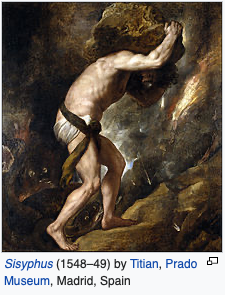We postulate that elections have consequences. And they do.
Mostly.
But Sisyphus, sentenced by Hades to try and fail for eternity, never got the rock to the top of the mountain.
Yesterday Dick Hall-Sizemore provided an excellent deep dive into the last couple of months of Board of Education meetings.
He reported that the pace of change since the new majority appointed by Governor Youngkin took their seats on July 1 has been glacial.
He noted that for the Board:
there is often material to be reviewed in preparation for upcoming meetings.
Therein lies the rub.
They are pushing a very heavy rock.
The process. The Superintendent of Public Instruction, her deputy superintendents, assistant superintendents, and the Board of Education each get to review what they are presented by staff. They can and do require changes, which then go back to the bureaucracy for correction.
And then further review.
The Superintendent works this every day. I suspect that she is starting to get what she wants.
The Board does it for one day eight times a year.
In the case of the VDOE bureaucracy support to the Board, I wish Superintendent Balow godspeed in getting her troops onboard with helping reverse policies that the same staffers spent eight years helping put in place. Enthusiastically.
A task worthy of Sisyphus, hopefully with a better result.
The Virginia Department of Human Resources Management Standards of Conduct are vague and can be in conflict.
Among “minimum expectations for acceptable workplace conduct and performance” is “Work cooperatively to achieve work unit and agency goals and objectives.” Good start. Agency goals and objectives are set by appointed leaders.
Support of the “best interests of the agency” and “the mission,” included as well, are in the eye of the beholder. The bureaucracy is the biggest beholder.
The size of the rock. In December of last year, the Board of Education published its 2021 Annual Report on the Condition and Needs of Public Education in Virginia.
From that document, we can see a few parts of the legacy of the McAuliffe/Northam-appointed Board and the two years of total Democratic dominance in Richmond of which the Board on which President Gecker proudly reported:
During the last Standards of Quality (SOQ) review cycle in 2019, the Board developed a comprehensive package of prescriptions, which were informed by education data and trends — particularly as they relate to student demographics, equity, staffing, resource allocation, nationally recognized best practices, and current prevailing practice in local school divisions.
In March, the Board approved revisions to the Guidelines for Uniform Performance Standards and Evaluation Criteria for Teachers, considered Phase Two of a more comprehensive overhaul. Most notably, these revisions updated research, revised the four-rating levels for summative evaluation and created a new performance standard, Culturally Responsive Teaching and Equitable Practices.
In July, the Board approved several revisions to the Model Guidance for Positive and Preventative Code of Student Conduct Policy and Alternatives to Suspension to include Standards for Dress and Grooming and the Standards for Reducing Bias in the Enforcement of Student Code of Conduct Policy.
The Board approved the Guidance on Cultural Competency Training for Teachers and Other Licensed School Board Employees in Virginia Public Schools as required by House Bill 1904 and Senate Bill 1196 from the 2021 General Assembly at the November meeting.
The guidance document provides a statewide definition of cultural competency and establishes micro-competencies for teachers and school principals and administrators across four domains: culturally competent reflection; culturally competent pedagogy and practice; culturally competent learning environments; and culturally competent community engagement.
Each of these SOQ prescriptions were thoughtfully aligned to the Board’s Comprehensive Plan to promote educational equity (Priority 1) support educator recruitment, development and retention (Priority 2), and support the implementation of the Profile of a Virginia Graduate and the revised school accountability system (Priority 3).
Priority 1 equity. Not quality. Quality did not make the top 3. It has played out in the steady collapse of school performance starting in 2018.
Then there are the six Board of Education advisory committees appointed by the Board itself. Members are each appointed to three-years terms.
That is quite a ship that the new Board majority must turn around. Without the help of the legacy board members. Daniel Gecker, on the BOE since 2015, is still President. The Vice-President is also a holdover.
My observation. In my years of reporting on VDOE staff support of the Northam-era initiatives, I viewed a hundred staff presentations to the BOE.
That support was unfailingly enthusiastic and often went much further than the laws that the regulators were tasked to implement.
In my 40 years of experience in government, bureaucracies will at best slow-walk anything of which they disapprove. In the best interests of the agency and its mission, of course. As they see them, not necessarily as seen by the appointed heads of agencies, who come and go.
I don’t doubt the good intentions of the VDOE bureaucracy that supported the Northam-era changes. But I don’t question their human nature either. They were demonstrably enthusiastic about policies they are now asked to overturn.
Superintendent Balow, both for the Governor and in her post as secretary of the Board of Education, is pushing a huge rock. She is a proven leader.
She will need all of her skills.
Updated Oct 28 at 10:20


Leave a Reply
You must be logged in to post a comment.